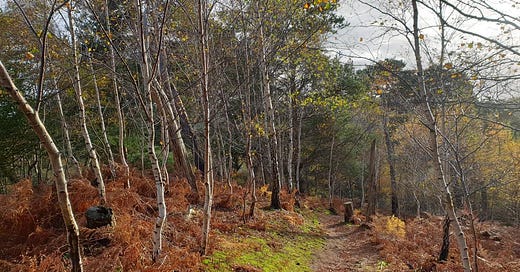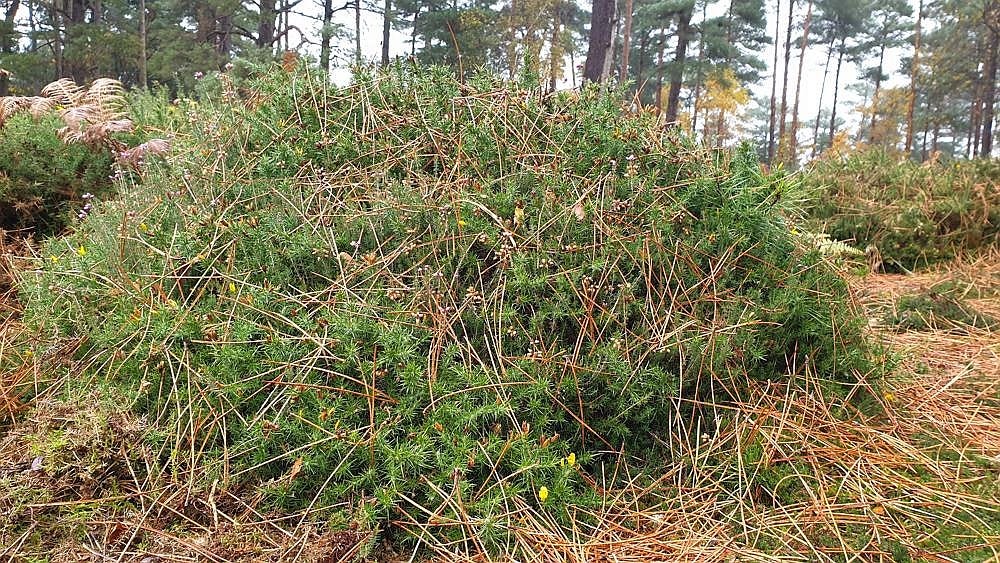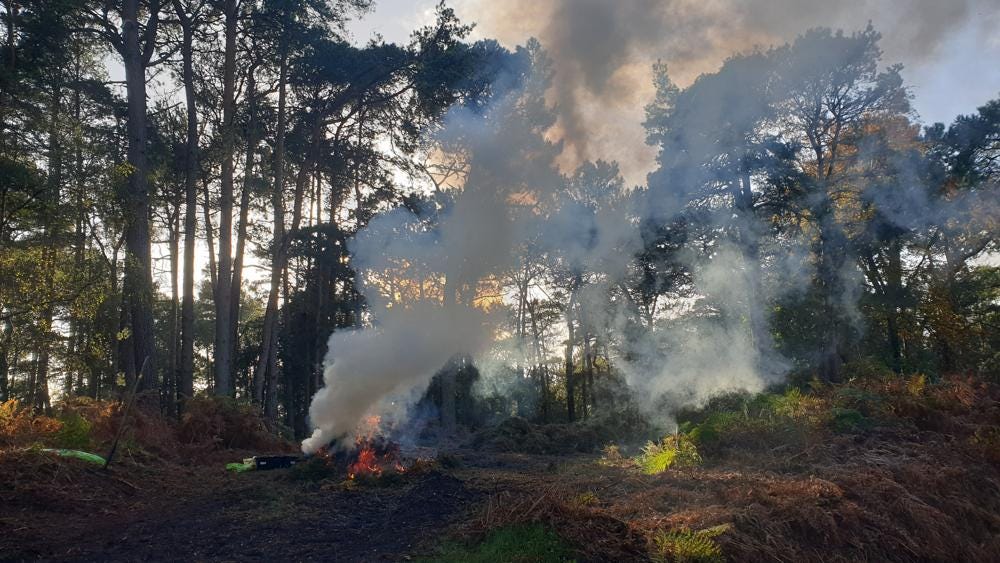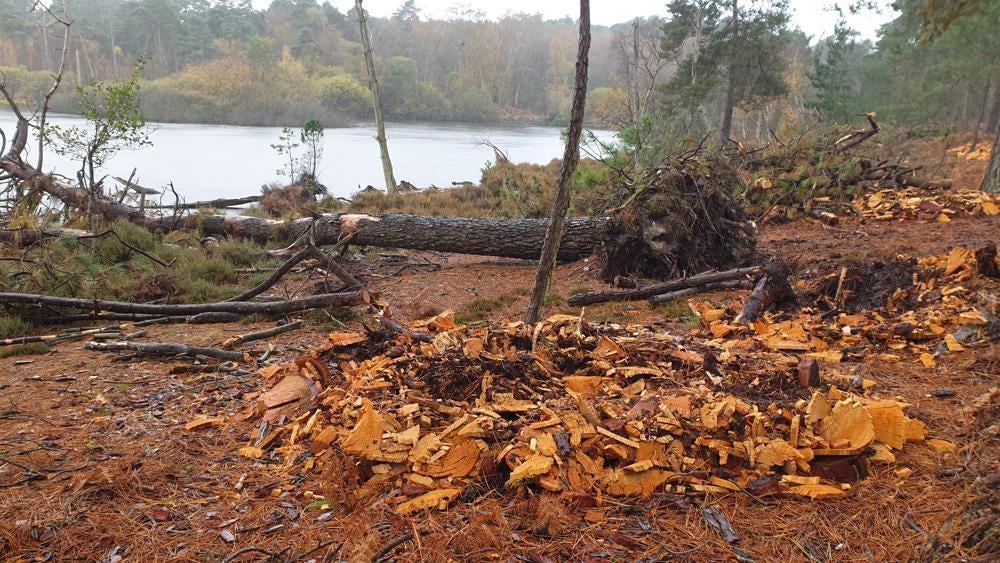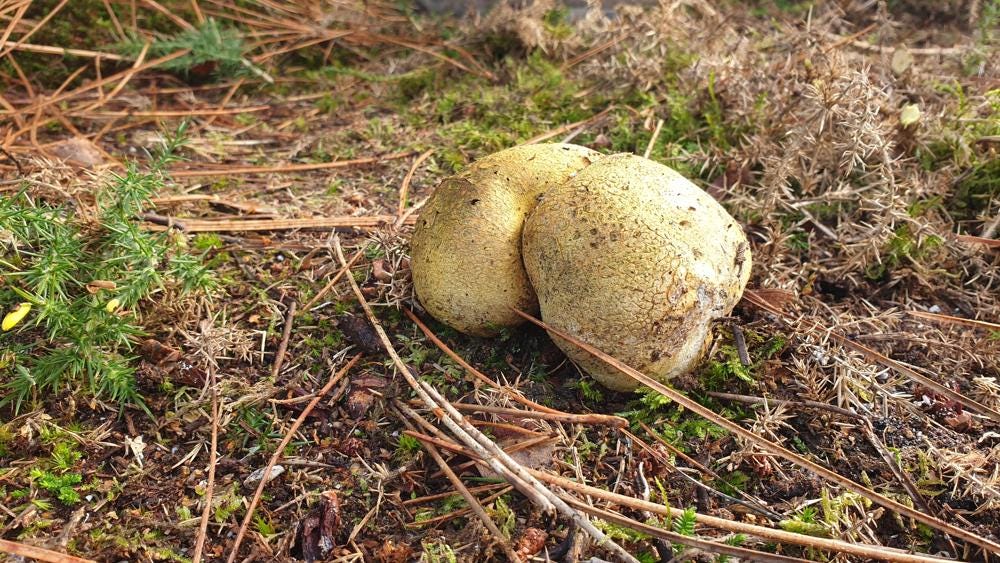Gorse Gawping
Screen eyes down in the soil, keyboard fingers plunging into the minutiae, uncovering the new worlds of stubborn gorse, plucky heather and squishy puff ball fungi.
Happy Friday-ish!
And welcome to edition 294 (isn’t that a lot?). For those of you who are new around these parts, my name is David Charles and I’m a UK-based comedy writer, outdoor instructor and bike botherer.
This week, with both Thighs of Steel and Foiled, we’ve passed a couple of milestones.
Thighs of Steel have committed to running the London to Athens relay ride in 2022. If you’re interested in joining us for a week in the summer, then please help us design the adventure so that it ticks your boxes.
On Tuesday, Beth and I sent the treatment for the feature-length theatrical edition of Foiled to two fantastic first readers. Feedback has been really positive and I guess the next phase is rewrites and then actual dialogue!
In among the professional activity, I managed to sneak in a night ride to the New Forest with the wonderful New Forest Off Road Club and a visit to Brownsea Island, which is the subject of today’s newsletter: more of a photostory than a wordstory.
Brownsea Island: Gorse Gawping
Brownsea Island is a nature reserve — nature refuge more like — adrift in Poole Harbour on the south coast of Britain.
If you’re an avid reader of these pages, you’ll know that I’ve written before about my conservation work with Dorset Wildlife Trust on Brownsea: bruising bracken so that we could clear the forest floor, making breathing room for the pretty little heathers that do so much for carbon capture and biodiversity.
Yesterday, we were scrabbling around in the gorse, using loppers to remove the prickly bush that dominates the springy heather.
Our job was to dive into the needles, gloves first, and trace the tight curls of the white-stemmed gorse back to its root while sparing the delicate red-stemmed heather.
The job was part exterminator, part detective. See if you can spot the strands of heather suffocating in the grip of this flowering gorse:
The patch of Brownsea that we were working on had been tucked away behind fences, meaning that gorse-trimming rabbits couldn’t keep the growth back to the forest floor. The fences hadn’t deterred the deer, however, and their dietary browsing had encouraged the gorse to become thick and bushy.
Over the course of four hours, a team of twelve volunteers cleared an area the size of a large living room. About forty huge bags of gorse went on the fire that billowed smoke signals on a southerly wind.
One of the surprising elements of the ongoing conservation project on Brownsea is the mass felling of trees.
This winter, 3,000 trees will be cut down, chopped up and carted off the island. The felling isn’t indiscriminate: the National Trust and Dorset Wildlife Trust have carefully identified individual trees whose felling will do most to promote a stronger ecosystem.
This happens in two ways. Firstly, by thinning the woodland, there are more nutrients available to the remaining, healthier, trees. One of the knock-on effects of this is that the nut harvest for Brownsea’s famous red squirrels will be, not smaller because fewer trees, but greater because those trees will be much more productive.
Secondly, fewer trees means that more sunlight will hit the forest floor and it is this sunlight that nourishes the ecologically important heathland. The soil under heathland captures more carbon per hectare than the soil under forests does. As I’ve said before: surprising, but true.
I find conservation work to be patient, a steady tempo in a companionable silence. Arriving on Brownsea after such a busy week (and a stressful near-ferry-missing cycle, teeth into a strong sea breeze) was better than a rest cure.
Screen eyes down in the soil, keyboard fingers plunging into the minutiae, uncovering the new worlds of stubborn gorse, plucky heather and squishy puff ball fungi.
100 Days of Adventure
🟢🟢🟢🟢🟢🟢🟢🟢🟢🟢🟢🟢🟢🟢🟢🟢🟢🟢🟢🟢🟢🟢🟢🟢🟢
🟢🟢🟢🟢🟢🟢🟢🟢🟢🟢🟢🟢🟢🟢🟢🟢🟢🟢🟢🟢🟢🟢🟢🟢🟢
🟢🟢🟢🟢🟢🟢🟢🟢🟢🟢🟢🟢🟢🟢🟢🟢🟢🟢🟢🟢🟢🟢🟢🟢🟢
🟢🟢🟢🟢🟢🟢🟢🟢🟢🟢🟢⚪⚪⚪⚪⚪⚪⚪⚪⚪⚪⚪⚪⚪⚪
Only 14 more to go! If you have ideas or invitations for adventures in the final seven weeks of the year, please reply or comment. What is this?
Policy Versus Society
According to the Pew Research Center, the proportion of citizens who say that having people from many different ethnic and religious backgrounds makes the UK a better place to live has increased since Brexit from 75 to 85 percent.
The proportion rises to 92 percent among the under-fifties and reflects a broader increase in support for diversity around the world.
This is at least suggestive that racially divisive policy doesn’t have to correlate with a racially divisive society. Thank fuck.
I’m on the train to London now, heading for, not one, but two birthday parties. How convenient that my two nieces should be born so close together!
Have a great weekend.
Big love,
dc:

